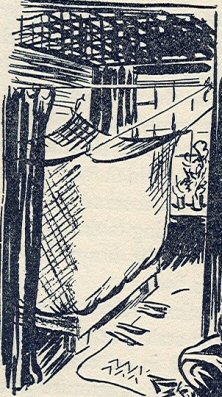 |
|||||
A cross-cultural tale:
|
|||||

|
From an un-cited source. This billowing mosquito net gives an idea of Cooper's sleeping quarters. |
An Excerpt from the Story
Esme Soporo marched into the clearing with her shoulders back, bare feet skimming the red earth. Two twisty pigtails, each ringed with scarlet hibiscus, poked up like devilish horns from a wild bush of black hair. High cheekbones. Flawless skin not as black as the women of Rendova; more a burnt umber. But clearly not a typical Solomon Islander, not with sunglasses, wristwatch, and that skin-tight "Free Willy" t-shirt.
"You're Mr. Cooper, yes? Welcome to Betumo Village." She curtsied, then offered her hand. She had a stevedore's grip. "You like my t-shirt?"
Cooper felt his face redden. He glanced away.
"A Piskoa guy gave me it." She twirled, short skirt flaring, and the scent of some exotic perfume swirled over him. Another city-bred fancy. No wonder she had the kid zinging.
"Isn't it a bit out of place in an SDA village?"
She grinned. "It's a modern. The village men praise it. Even Chief Betu."
Cooper imagined her with young Derrick on that beach, lips inviting, voice cooing. Her come-hither would thaw an embassy Marine. Cooper envied the Peace Corps kid his youth. But that's the problem: youth. Village life served up a solitude these kids had never faced. Without the American smorgasbord of daily diversions - TV, CDs, computers, magazines, concerts, malls, sporting events - village life suffocated them. They had to learn to sit and talk, one-on-one, day after day. Like the Graces, Solomons women reeled the young Americans in - not only with their dark beauty, but with their eagerness to listen. This wasn't going to be cut and dried as Cooper first thought. "I need to ask some questions, Miss, about -"
"Of that dance, it's a nothing. We met at the cove, a dozen or so, including also two other women teachers. Only we teachers and village boys, no waetmen. We storied, and drank Pepsi-Cola. We danced to a cassette-player, each apart and without touching man-to-woman. It's in the limbo that jealousy arose, for I bested all, even the men. I'm an excellent dancer. Watch." She sprang up, and the packed-earth clearing became a polished dance floor. She coiled, leaped and arched, her supple body glistening. . . .
Language Note on Pijin |
- Return to Culture Stories
- Go to the short story "Whispers"
- Find instructional resources about the Solomon Islands
"Whispers" was first published in Confluence, Vol. 16 (published by the Ohio Valley Literary Group and Marietta College).
Return from Peace Corps Fiction to Culture Stories
Return to Your Language Guide home

Why Peace Corps Fiction?
"The writings of Returned Peace Corps Volunteers (RPCVs), all their novels, short stories, essays and poetry are a positive way of educating Americans about the world." It "is at the heart of the Third Goal of the Peace Corps to 'bring the world back home.'" www.PeaceCorpsWriters.org
The Whole World Guide
Love the ideas and language learning tips here in our website? Want to learn more about the Walkabout method? Buy your own copy of The Whole World Guide to Language Learning: How to live and learn any foreign language.
This book is chock full of ideas on how to use Walkabout language learning. It has sample lesson plans as well as language learning drills and practice tips. Order your copy today.
Then why not use the button below, to add us to your favorite bookmarking service?
Copyright© 2007-2016 YourLanguageGuide.com
All rights reserved.
Return to top
New! Comments
Have your say about what you just read! Leave me a comment in the box below.